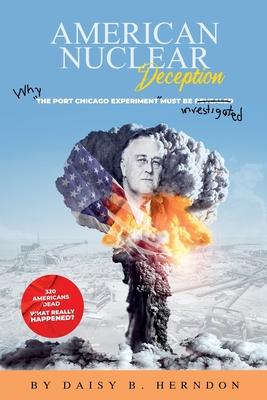When it comes to the bomb, what we don't know could kill us. Written for ordinary readers by a concerned American citizen, American Nuclear Deception shows how the history of the bomb impacts current nuclear policy. This fresh evidence is seen through the surprising lens of the Port Chicago nuclear explosion theory (PCnet).
The controversial theory, introduced in The Black Scholar (Spring 1982), was denied by the U.S. government; "dissed" by traditional historians; distorted by sensational conspiracy theorists; and deleted from Wikipedia -- all without benefit of an official investigation. Peter Vogel researched his theory for 35 years, but in December 2018 the senior scholar shut down his website, withdrawing his singular ebook, The Last Wave from Port Chicago.
This book updates the PCnet, exposing the vital, documented connection between the Manhattan Project and the unexplained explosion that destroyed two ships at the Port Chicago Naval Ammunition Depot near San Francisco on July 17, 1944, killing 320 Americans. According to a local newspaper, most victims were 'atomized'.
The unprecedented blast is still listed as one of the largest non-nuclear explosions in history; but the greatest home-front disaster of World War II was upstaged by the mass mutiny trial of "the Port Chicago 50" why?
A Naval board ruled that the cause could never be determined -- but one of the three men on the board, Capt John Crenshaw, was related to Capt William S. Parsons, the man responsible for producing the bomb. Crenshaw was with Parsons on July 20, 1944, when he led his research team to Port Chicago to study "the effects of the detonation."
A large body of wide-ranging new evidence supports the PCnet, overcoming opinion-based objections. Readers will learn
- Why it matters that Albert Einstein did not actually write the famous letter to FDR.
- Why FDR flipflopped on integrating the Navy after authorizing the top-secret bomb project.
- How Einstein's work on torpedo design as a Navy consultant in 1943 may have supported Parsons' quest for an atomic torpedo.
- A secret reason for FDR's secret trip to the West Coast during the 1944 Democratic National Convention;
- Why FDR's flagship was in the Port Chicago area on the day of the explosion;
- Why a false press release about an explosion at an ammunition depot was used to cover up the famous Trinity test.
- How the Port Chicago explosion led to the Trinity test, the bombing of Hiroshima and Nagasaki, Operation Crossroads, the Nevada Proving Ground . . . and current nuclear policy
Experts acknowledge that false assumptions have left many questions about the bomb unanswered. Instead of Truman's decision to use the bomb, the PCnet highlights FDR's single-handed decision to create the world-changing weapon.
In the end, Readers decide: The Port Chicago disaster -- was it a nuclear explosion?
The Department of Defense said: ". . . ridiculous." The Navy History and Heritage Command says "hogwash." The Port Chicago National Memorial says "unlikely." In 1993, two historians, Lawrence Badash and Richard G. Hewlett, called Vogel's original article "A Story Too Good to Kill". But American Nuclear Deception shows why the Port Chicago nuclear explosion theory is too important to ignore.
